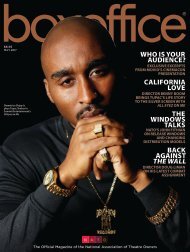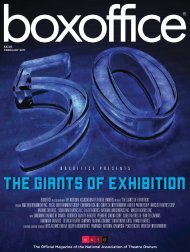Boxoffice - October 2016
The Official Magazine of the National Association of Theatre Owners
The Official Magazine of the National Association of Theatre Owners
You also want an ePaper? Increase the reach of your titles
YUMPU automatically turns print PDFs into web optimized ePapers that Google loves.
y Jeff Logan, President, Logan Theatres<br />
Don’t you love it when a customer<br />
calls and asks what time<br />
tonight’s matinee starts? Or if<br />
you’re giving a customer a tour<br />
of the projection booth and they<br />
say, “Wow, that’s a big camera!”<br />
Admittedly, show business has a<br />
language of its own. The origins<br />
of some of those terms are as<br />
interesting as the terms themselves.<br />
There’s a lot for industry<br />
professionals to learn. No wonder<br />
the public gets confused! Here’s a<br />
list of some of the most misused<br />
and misunderstood terms, along<br />
with their correct definitions.<br />
MATINEE is an afternoon (or morning) showing. Many studios and theater chains set different<br />
cutoffs, but traditionally a matinee is any showing starting before 6 p.m. Since most theaters started<br />
promoting bargain matinees, many customers now mistakenly think a matinee refers to a showing<br />
with a discount price. Hence questions like, “Is tonight’s show a matinee?” That would be a no.<br />
VAUDEVILLE was a variety show performed live onstage. It<br />
usually consisted of eight acts of singers, comedians, jugglers,<br />
magicians, acrobats, etc. Vaudeville started in the 1880s and was<br />
popular until the increasing attractiveness and lower cost of movies<br />
put it out of business in the 1920s. Many old, large downtown<br />
single-screen theaters started as vaudeville theaters. There were<br />
vaudeville theaters in towns with populations as small as 2,000.<br />
Vaudeville struggled on as many leading big city theaters ran combined<br />
silent movie and vaudeville programs until sound movies<br />
came along in 1927, and the Depression made the cost of putting<br />
on live shows too expensive. Many of the great comedians like Jack<br />
Benny, Bob Hope (left), and Morey Amsterdam (Buddy Sorrell on<br />
The Dick Van Dyke Show) were already famous vaudeville stars before<br />
switching to radio, movies, and TV. Today’s America’s Got Talent is basically an amateur vaudeville<br />
show. Cool movies to watch about that era are Yankee Doodle Dandy, Seven Little Foys, and Gypsy.<br />
SNEAK PREVIEW is an advance showing of a new movie from a day to a week or two before its<br />
announced opening date. These showings are used to build awareness and positive word of mouth<br />
about a new movie. Sometimes, in the old days, the title wasn’t advertised. The studio would pick a<br />
similar picture and advertise a sneak preview of “a major new motion picture” along with the regular<br />
feature. The public got to see two movies for the price of one and be the first to see a major new hit.<br />
Sneak Previews have always been common in Hollywood and in major cities. Nowadays studios<br />
encourage all theaters to run Sneak Previews of major films on the Thursday night before a Friday<br />
opening. But if you advertise a Thursday showing as a Sneak Preview, small town locals will ask, “Do we<br />
get to see the whole movie or just the preview?” Yeah, like we’re going to charge you full price to watch<br />
a two-and-a-half-minute preview. To avoid this confusion, my company advertises a Thursday night<br />
showing as a “Special Advance Showing.” Other theaters just refer to the Thursday night showing as a<br />
32 BoxOffice ® OCTOBER <strong>2016</strong>
















